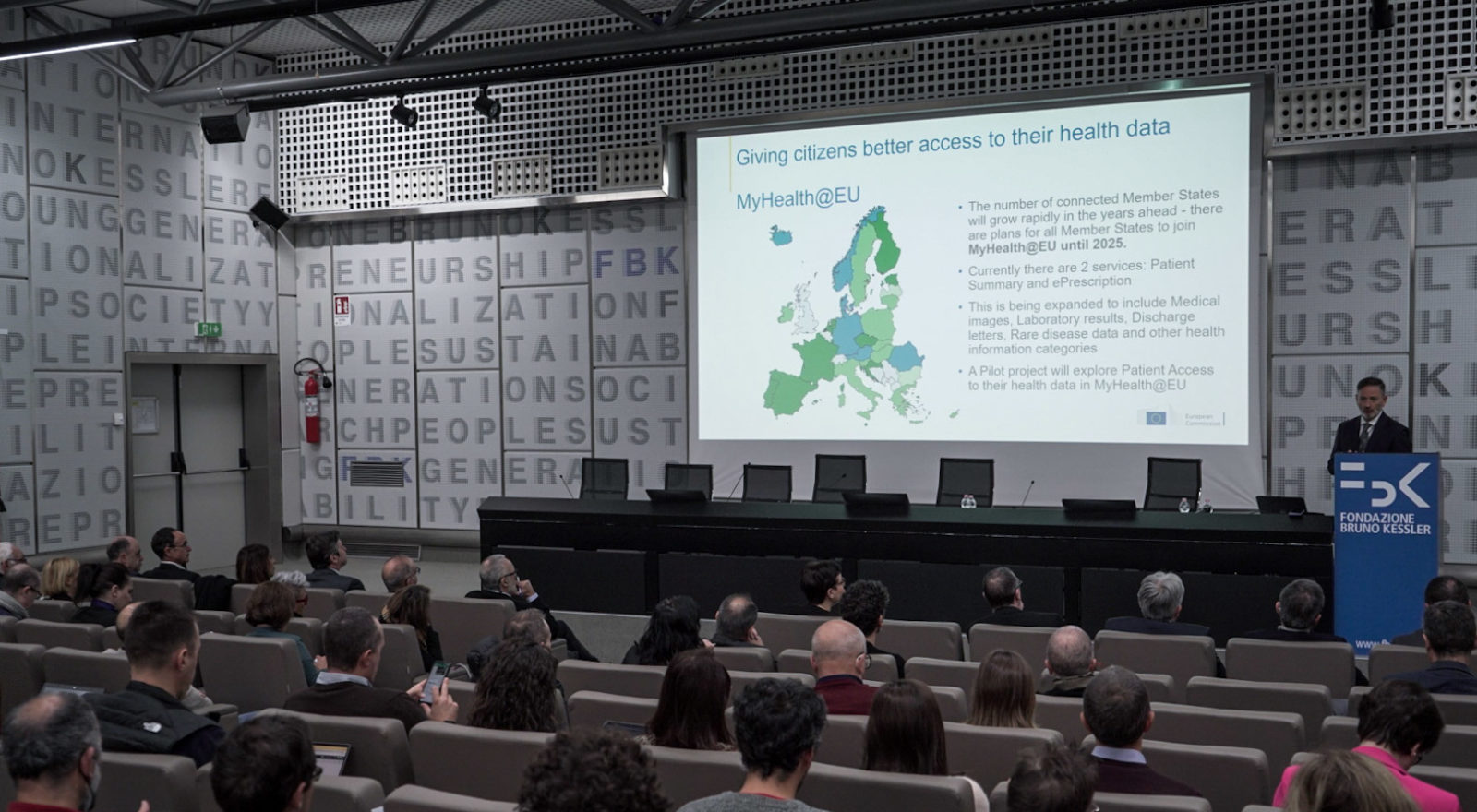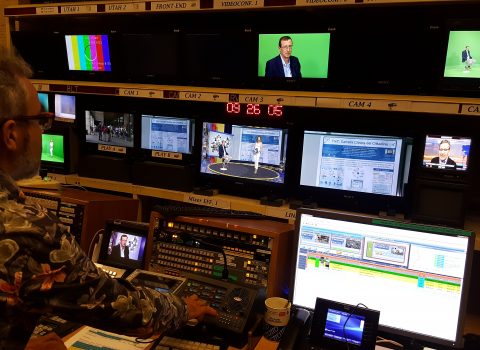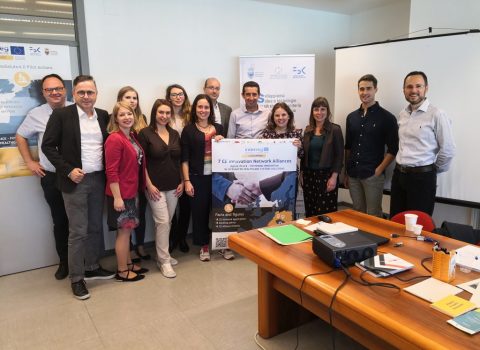Health, data processing and European regulations
An event on the safe and secure exchange, use and reuse of electronic health data held at FBK
The event, “Digital Health – The European Data Strategy” was held November 14, 2022 at Povo, was an opportunity for discussion dedicated to the local ecosystem research and innovation players as well as to interested citizens to learn more about the new European regulatory framework related to data processing in healthcare.Rules, standards, common practices, infrastructure and public policy, to understand more about the new European strategy and the impact it will have on healthcare: what benefits will the creation of a single market for data bring to citizens and to the economy? Will it really be able to improve personalized treatment, provide better health care, make public services more efficient while protecting citizens’ privacy? Speakers include Trento Province councillors Achille Spinelli and Stefania Segnana, Fondazione Bruno Kessler secretary general Andrea Simoni, University of Trento President Flavio Deflorian, Trentino Innovation Hub Foundation president Ivonne Forno, and Alfredo Maglione, president of the ICT and digital technologies section at Confindustria Trento. Special guest will be Marco Marsella, head of the Health, Wellbeing and Aging Unit of the Directorate-General for Communication Networks, Content and Technologies at the European Commission (DG Connect).
The European Data Strategy, an integral part of the European Strategy for the Digital Decade, aims to establish the European Union as a global leader in a data-driven society. In fact, the European Commission estimates that by 2025 the global volume of data will increase by 530 percent and reach 829 billion euros, employing more than 10 million professionals.
This and the implications of creating a single market, with data circulation within the EU, were discussed at the event “Digital Health – The European Data Strategy,” held at Fondazione Bruno Kessler.
Councillor for Economic Development, Research and Labor of the Autonomous Province of Trento Achille Spinelli opened the proceedings, “Digital technologies will guide our choices, but they can do so accurately through advanced tools. Today’s event testifies to how important it is for institutions, research organizations and also businesses to think together, in a system perspective, to work and develop new solutions capable of fostering the twin transitions – the digital and environmental one – that are at the heart of the PNRR in this phase of critical recovery for the European and Trentino territories. Telemedicine projects, the application of artificial intelligence to data, their correct protection and processing including in secondary use, the topics we will talk about today, will be issues at the center of innovation in health care, including in our local area. I find it very important to discuss with the European source, and I thank Dr. Marsella for his presence. I am happy to see that Europe finds in Trentino a context where there are experienced people and institutions, an example to rely on for development and innovation.”
The talk of Councillor for Health, Social Policies, Disability and Family, Stefania Segnana, is also relevant: “When we talk about digital data, we are talking about a delicate issue on which as a Province and APSS we must pay the utmost attention. Health data is very sensitive from the point of view of privacy and knowing how to collect and manage it is critical. In these pandemic years, remote follow-up with patients has been crucial. Trentino Health 4.0 has worked a lot on solutions to keep doctors and patients in touch; from these excellent results we must start to discuss and work for our future. The European strategy will also be crucial for us to keep on this track. Dr. Marsella’s participation today brings from this point of view a fundamental input. We have had the opportunity to showcase our innovative applications in digital health in the Senate and they have been appreciated nationally. Today’s meeting will certainly act as a stimulus for our ecosystem to keep on the right track.”
Also speaking at the opening were Trentino Innovation Hub Foundation President Ivonne Forno, Fondazione Bruno Kessler Secretary General Andrea Simoni, University of Trento President Flavio Deflorian, and Confindustria Trento ICT and Digital Technologies Section President Alfredo Maglione. Strongly emphasized by all speakers was the importance of fostering system-wide data-driven innovation in line with European guidelines, which can bring significant benefits to citizens in many areas, not least of which is health care. The COVID-19 pandemic demonstrated this: having up-to-date, reliable and accessible health data is essential to respond to crises in an efficient manner when it comes to public health. “At the University of Trento,” emphasized President Flavio Deflorian, “there are two courses closely related to the theme of digital health: Medicine and Surgery, offered in collaboration with the University of Verona, and the master’s degree course in Data Science, implemented with the help of Fondazione Bruno Kessler. All the actors in the field are therefore looking with particular interest at the European Commission’s proposal for the ‘European Health Data Space’.”
Marco Marsella, head of the Health, Wellbeing and Aging Unit in the Directorate-General for Communication Networks, Content and Technologies at the European Commission (DG Connect), gave a central talk: “Trentino is one of Europe’s ecosystems of excellence in the health field, I was really pleased to accept the invitation to participate in this meeting to talk about the new European data strategy and what the new European Health Data Space will be. The new strategy aims to create a single market for data that will allow data to circulate freely within the EU and across sectors, benefiting businesses, researchers and public administrations. In the European institutions we are working on these issues to facilitate, for example, the exchange of data and documents between member countries. Just think of the projects that have been working on fostering the exchange of records and prescriptions abroad, connecting databases and creating a system that translates codes to identify diseases and drugs. The new Data Governance Act and the European Health Data Space will set the stage for further fostering these innovations, while regulating the complex mechanisms involved in the use of data. The aim is to create a secure and reliable system at both technological and legal levels that will bring significant and concrete benefits for citizens and the European economy, from improving decision-making to improving public services.”
After the talk by Marco Marsella of DG Connect, an active discussion took place among the actors of the Trentino research and innovation system in the field of digital health, to explore the topic of the secondary use of health data for the purposes of scientific research, personalized medicine, statistics and digital health applications. Speaking, in addition to Marco Marsella of DG Connect, were: Giancarlo Ruscitti (Autonomous Province of Trento), Pier Paolo Benetollo (APSS), Alessandro Bazziga (APSS), Stefano Forti (Fondazione Bruno Kessler), Sandro Fiore (UniTrento – DISI), Giorgia Bincoletto (UniTrento – Law), Antonio Colangelo (GPI S.p.A.), Laura Pedron (Autonomous Province of Trento).
The event was conceived and organized by the Autonomous Province of Trento, Fondazione Hub Innovazione Trentino, Fondazione Bruno Kessler, Azienda Provinciale per i Servizi Sanitari, Trentino Salute4.0, University of Trento, and was created within the framework of the Province’s Intelligent Specialization Strategy (S3) 2021 – 2027, a document that defines the development trajectories of the provincial economic, productive and social system.
Press release HIT – Trentino Innovation Hub | Trentinosalute4.0



